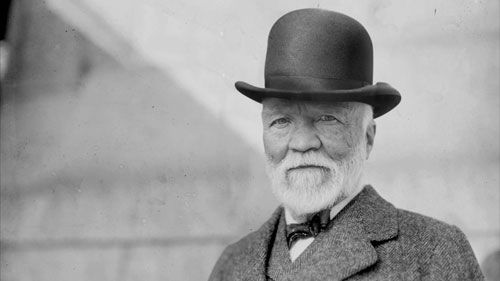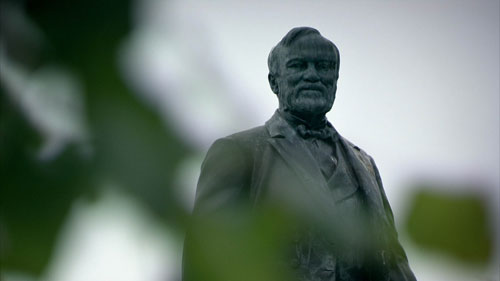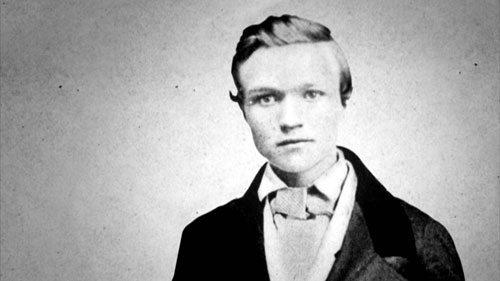BILLIONAIRE steel magnate Andrew Carnegie tried to bribe the Germans in a desperate attempt to stop World War 1.
A new documentary reveals how the early 20th century philanthropist put forward diplomatic envoys and offered Kaiser Wilhelm millions of pounds in exchange for peace.
Carnegie was used to success, but was left “broken” after US President Roosevelt blocked an attempt to put his “absurd” plans to the German Emperor.

It was a loss that plunged the Scots-born Carnegie into a deep depression and ill-health – and may ultimately have caused him to lose hope.
The film, ‘Andrew Carnegie: Rags to Riches, Power to Peace’, is made by London-based production company Galeforce and is narrated by actor Brian Cox.
It previewed at the Edinburgh International Film Festival last month, and is scheduled for release by BBC Scotland.
The film chronicles Carnegie’s life, from his birth in a weaving shed in Dunfermline, Fife, and tells how he travelled to the New World with his impoverished family in the 1840s in search of the American dream, ultimately becoming one of the richest men in the world.
Producer Sonita Gale, of Galeforce Films, said: “Carnegie really thought he could stop the war. He was used to getting his own way and did not give up.

“He offered the Kaiser a multi-million pound package which he rejected and later sent peace envoys to Germany just before the war broke out to have diplomatic talks right until the bitter end.
“He was the richest man in the world who got his own way in almost everything he put himself to but as soon as the war broke out he gave up.
“He fell silent, stopped talking to friends and moved back from Scotland to America after falling into a serious depression. He died a broken man.”
He said: “He was a man used to getting his own way, and he would have given away his entire fortune to stop the First World War.”
Carnegie first started out in the US as a telegraph operator and moved from job to job before building his empire, Carnegie Steel.

Despite the business being a key part of the manufacture of arms and warships for the US Navy, he was later seized with a paradoxical determination to avert war.
His huge influence in business convinced him he could persuade the German Emperor, Kaiser Wilhelm, to stop the carnage of WW1 before it began.
The number of people killed or injured in the Great War, fought between 1914-1918, is a matter of academic dispute but most estimates sit at around 9.5m casualties.
Around 20% of soldiers are also thought to have suffered from “shell-shock”.
After attempting to woo American president, Theodore Roosevelt, to negotiate Anglo-German peace talks with the Kaiser in Germany and his cousin, King Edward VII in England, Carnegie banked on brokering compulsory arbitration between nations.
Flawed
But Roosevelt believed Carnegie’s Utopian plan was flawed. Even though the tycoon had financed an African safari in return for his talks with the Kaiser, discussion with the German was superficial.
The president refused to deliver Carnegie’s script and what he felt were ‘absurd’ peace plans.
In the meantime, King Edward died, and the German war machine was already revving its engines and the world reacting.
David Nasaw, Carnegie’s biographer, said: “He (Roosevelt) indirectly raised the question of Germany’s slowing the naval arms race with Britain, but indicated he would not be disturbed if there were no movement towards disarmament. He was assured the Kaiser was a practical man and in no sense, a peace at any price man.”
“Even if the Kaiser (had) agreed to move forward, now there would be no partner for peace awaiting him in Britain.”
Surrender
Carnegie’s bold plans collapsed and when he realised he was defeated, he was reluctantly forced to surrender.
Mr Nasaw added: “If Andrew Carnegie were alive today, he would use every ounce of his energy, every dollar of his money, all his wit, his charisma, his intelligence, to create international peace movements that would stop the scourge of war.”
Carnegie’s Peace Palace was established in the Hague in 1913, where international leaders came and met to arbitrate, and it is still standing.
As he died, he wrote in his diary: “I may daily grow frail in my body but my hopes remain that one day war will be banished by an international court for peace.
“That day will mark the moment when man stops killing man – the deepest and bleakest of crimes.”
Carnegie: Rags to Riches, Power to Peace will show on BBC Scotland in August.
